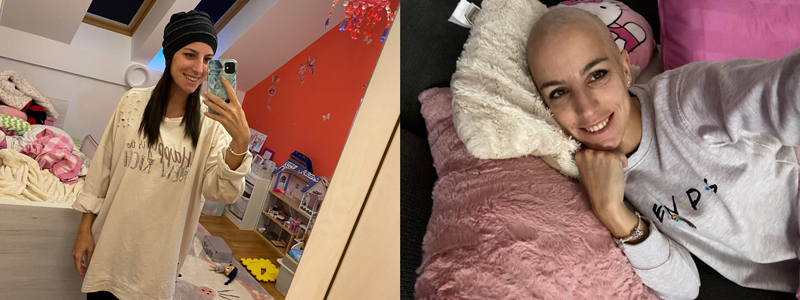Dear readers,
In my previous blog, I shared my experience with mental health care during and after the treatment, which I believe is vital for recovery. Today, I want to highlight another important topic – the daily challenges we face during the treatment, such as diet, physical activity, and general adjustments to everyday life.
As someone who has undergone various types of therapies, I believe it is valuable for those who are facing a similar journey to learn how the treatments affect average life and how manage the side effects of the therapies. Those of us who have been through it know that cancer treatment affects not only our health, but also our relationship with food and our sense of taste. For me, the beginning of the therapies was quite difficult as I lost my sense of taste. Food seemed tasteless and I often tasted iron, which further reduced my appetite and led to weight loss.
When the team at the Institute of Oncology Ljubljana noticed that I was losing weight, they referred me to their Nutritional Clinic, where I was given high-calorie drinks to prevent too much weight loss. The lowest weight I reached was 48 kilograms. As the therapies progressed, my appetite gradually improved, but I was closely monitored at the Nutritional Clinic the whole time. I am very grateful for this support, because we know that despite the challenges of the therapies, we need to support the body with a nutritious diet. However, this was difficult as the therapies kept changing my taste and appetite, creating a vicious circle.
I would like to emphasize once again the importance of maintaining a healthy diet with sufficient protein intake. As a patient, I received really good care from the Nutritional Clinic and I am more than grateful for all their advice and support.
Chemotherapy weakens the immune system, so nutrients strengthening the immune system are essential. Proteins, vitamins (especially A, C and D), minerals, and antioxidants help to defend against infections. A proper intake of nutrients gives the body more energy to fight disease and reduces the risk of fatigue.
For me, weight loss became serious concern. It meant less energy and strength, and every chemotherapy session brought the fear that my treatment might be postponed due to poor blood counts. Fortunately, this only happened once, during my 14th session.

Personally, my “recipe” to keep going was to follow a very high-calorie diet (although I had several smaller meals a day, because I couldn’t manage larger portions at once). My family also somehow got used to my eating habits during this period and together we got into the rhythm. During chemotherapy, I also experienced digestive issues, so I ate more “boring foods” (e.g. rice, bananas) and I had to take care of my hydration. Interestingly enough, I am a big coffee drinker, but I didn’t really like it the first days after the chemotherapy — so that’s when I knew: ˝Now I know for sure I am sick˝ (just kidding! 😊 ).
Cancer definitely brings many changes to everyday life – not only because of the health problems and the treatment, but also because of the impact on your emotional and social life. As healthcare becomes a central part of your day, it often changes the way you experience normal activities and relationships.
Socializing with friends and participating in support groups where people with similar experiences are present can be of a great help. Talking to others who understand what you are going through can give you a sense that you are not alone and that someone is truly aware of what you are going through. In addition, support groups are a great occasion to share advice, information on managing the side effects of treatment, and to share experiences that can help overcome everyday difficulties.
First of all, our “onco mafia” as we affectionately called it, was really exceptional! We went hiking, we talked to each other, exchanged experiences, advices, and created a space where we understood each other. All of us who have gone through such difficult moments know exactly that cancer is a ˝real shocker˝, and often, people around us don’t even understand us. And that’s okay, because cancer is one of those experiences where only someone who has lived through it can truly understand.
In addition to our “onco mafia”, I also participated in a support group at the Institute of Oncology Ljubljana, where I met fellow patients – some who had already been through or were done with the treatment, and also patients who were still undergoing it.
The support group was a safe space, where we could share our stories and experiences and, in a way, relieve each other of the hardships of living with cancer. Through the meetings we learned a lot – about life after treatment, where to turn in times of need, and how to keep moving forward.
The connection between support and nutrition is indispensable during chemotherapy. Support groups offer emotional and social support to patients, and proper nutrition helps us to maintain physical strength and vitality. Together, these two elements can make a significant contribution to improve treatment tolerance and enhance patients’ overall quality of life.
